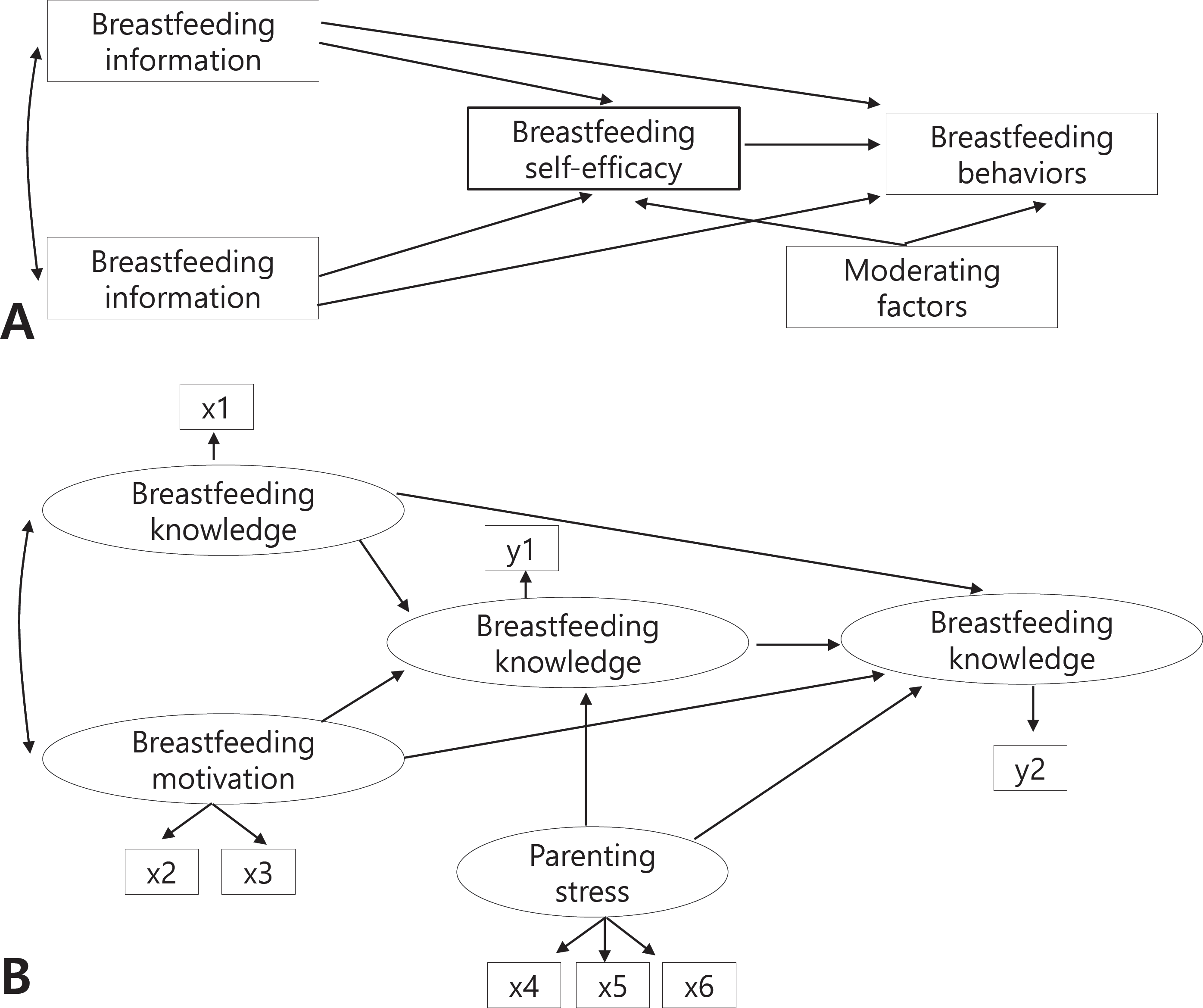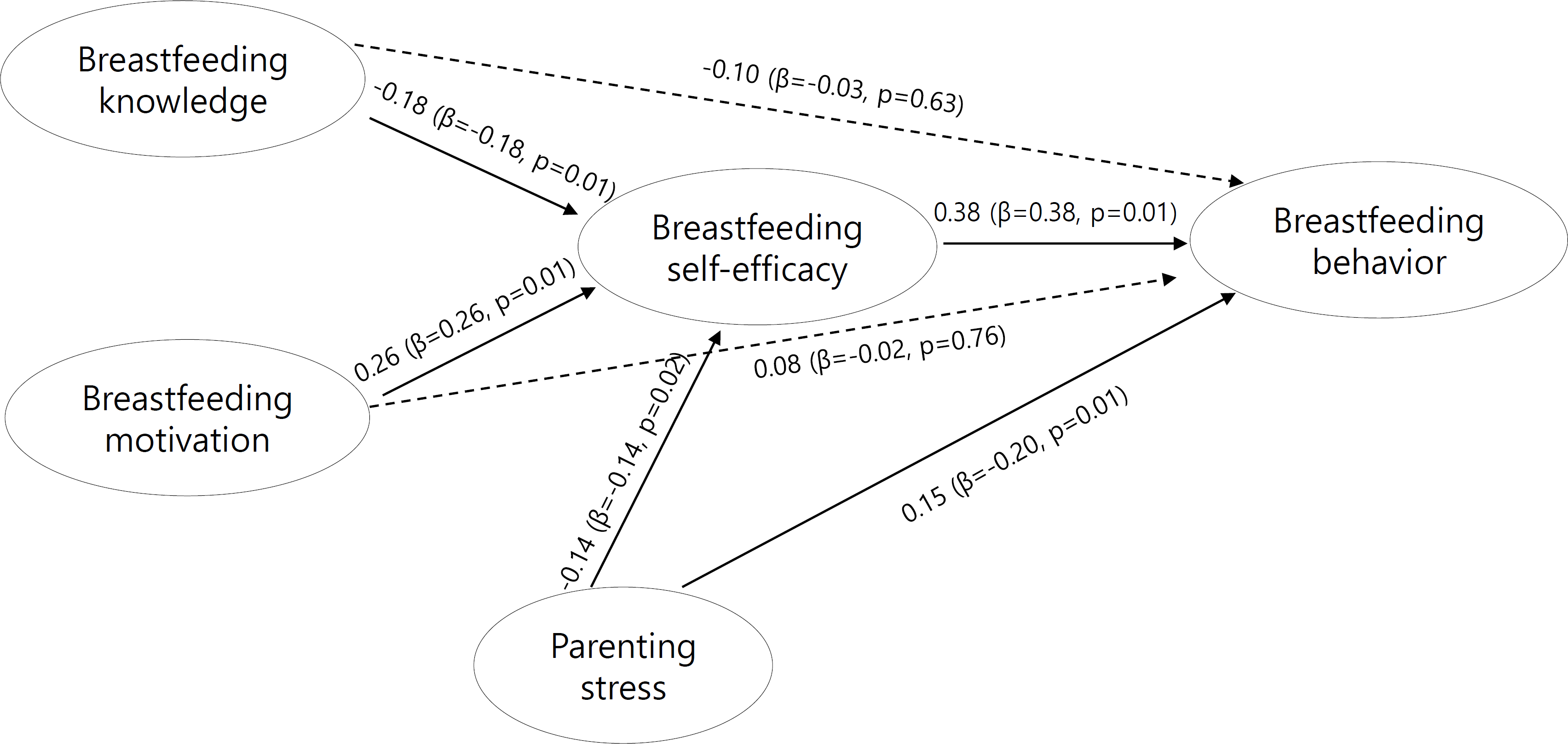American Academy of Pediatrics, Section on Breastfeeding. Breastfeeding and the use of human milk. Pediatrics. 2012. 129:e827–41.
Brockway M., Benzies K., Hayden KA. Interventions to improve breastfeeding self–efficacy and resultant breastfeeding rates: a systematic review and meta–analysis. J Hum Lact. 2017. 33:486–99.

Chan MY., Ip WY., Choi KC. The effect of a self–efficacy–based educational programme on maternal breast feeding self–efficacy, breast feeding duration and exclusive breast feeding rates: a longitudinal study. Midwifery. 2016. 36:92–8.

Choi EJ., Park EJ., Kim HR., Oh MA., Lee NH., Choi JH. The 2016 national survey on breast feeding. Seoul: Korea Institute for Health and Social Affairs;2016. Report No.: 2016–17.
Feldman–Winter L. The AAP updates its policy on breastfeeding and reaches consensus on recommended duration of exclusive breastfeeding. J Hum Lact. 2012. 28:116–7.

Fisher JD., Fisher WA. Changing AIDS–risk behavior. Psychol Bull. 1992. 111:455–74.

Fisher JD., Fisher WA., Amico KR., Harman JJ. An information–motivation–behavioral skills model of adherence to anti-retroviral therapy. Health Psychol. 2006. 25:462–73.

Fisher WA., Fisher JD., Harman J. The information–motivation–behavioral skills model: a general social psychological approach to understanding and promoting health behavior. Suls J, Wallston KA, editors. Social psychological foundations of health and illness. Malden (MA): Blackwell Publishing Ltd.;2003. p. 82–106.

Ha B., Kim S. Exclusive breastfeeding rates and it's influencing factors by the 1st and 6th month of postpartum. J Korea Contents Assoc. 2018. 18:230–40.
Heo SH., Noh YG. Impact of parenting stress and husband's support on breastfeeding adaptation among breastfeeding mothers. Korean J Women Health Nurs. 2017. 23:233–42.

Holden G., Meenaghan T., Anastas J., Metrey G. Outcomes of social work education: the case for social work self–efficacy. J Soc Work Educ. 2002. 38:115–33.
Jang MK., Lee SM., Khil JM. Belief factors associated with breastfeeding intentions of single women: based on the theory of planned behavior. J Nutr Health. 2017. 50:284–93.

Kang HC. Analysis of the goodness–of–fit index in the structural equation model and discussion of the model fit strategies. J Korean Data Anal Soc. 2013. 15:653–68.
Kestler–Peleg M., Shamir–Dardikman M., Hermoni D., Ginzburg K. Breastfeeding motivation and self–determination theory. Soc Sci Med. 2015. 144:19–27.
Kim JE., Park DY. A study on predicting behavioral intention of breastfeeding among primigravida. Korean J Community Nutr. 2001. 6:331–9.
Kim M., Lee J., Kim T. The study of relationship between breastfeeding and metabolic syndrome and its components in premenopausal parous women: from the Korean national health and nutrition examination survey, 2010–2016. J Korean Soc Matern Child Health. 2020. 24:154–61.

Kim S., Lee H., Kim S., Kim SY. Effects of prenatal breast self–massage education on breastfeeding self–efficacy, adaptation, and practice in primiparous women. Korean Parent Child Health J. 2017. 20:18–27.
Kristensen IH., Simonsen M., Trillingsgaard T., Pontoppidan M., Kronborg H. First–time mothers' confidence mood and stress in the first months postpartum. a cohort study. Sex Reprod Healthc. 2018. 17:43–9.

Laugen CM., Islam N., Janssen PA. Social support and exclusive breast feeding among canadian women. Paediatr Perinat Epidemiol. 2016. 30:430–8.

Lee HK. Construction of a maternal role acquisition model for first–born mothers during the postpartum period [dissertation]. Seoul (Korea): Seoul National University;1992.
Lee J., Bang Y., Bae J. Longitudinal relationship between the child–rearing knowledge, and self–esteem and parenting stress of mothers with a child in infancy. J Open Parents Educ. 2016. 8:27–41.
Lee SY., Kim EJ., Park JS., Byun SJ., Oh MA., Lee SR, et al. The 2018 national survey on fertility and family health and welfare. Seoul (Korea): Korea Institute for Health and Social Affairs;2018. Report No.: 2018–37.
Maehara K., Mori E., Iwata H., Sakajo A., Aoki K., Morita A. Postpartum maternal function and parenting stress: comparison by feeding methods. Int J Nurs Pract. 2017. 23(Suppl 1):
https://doi.org/10.1111/ijn.12549.

McQueen KA., Dennis CL., Stremler R., Norman CD. A pilot randomized controlled trial of a breastfeeding self–efficacy intervention with primiparous mothers. J Obstet Gynecol Neonatal Nurs. 2011. 40:35–46.

Meedya S., Fahy K., Kable A. Factors that positively influence breastfeeding duration to 6 months: a literature review. Women Birth. 2010. 23:135–45.

Min HY. The effects of hybrid application breastfeeding promotion program for premature infants [dissertation]. Seoul (Korea): Ewha Womans University;2016.
Park M., Park KM. Effects of a reinforcement program for postpartum care behavioral skills of couples with their first baby. J Korean Acad Nurs. 2019. 49:137–48.

Park SH., Ryu S. Effects of breastfeeding interventions on breastfeeding rates at 1, 3 and 6 months postpartum: a systematic review and meta–analysis. J Korean Acad Nurs. 2017. 47:713–30.

Sahin BM., Ozerdogan N., Ozdamar K., Gursoy E. Factors affecting breastfeeding motivation in primiparious mothers: An application of breastfeeding motivation scale based on self–determination theory. Health Care Women Int. 2019. 40:637–52.
Shim JI., Kang SJ. Impact of breastfeeding knowledge, attitude, and barriers on breastfeeding practice among twin mothers. Korean J Women Health Nurs. 2017. 23:89–98.

Shiraishi M., Matsuzaki M., Kurihara S., Iwamoto M., Shimada M. Post–breastfeeding stress response and breastfeeding self–efficacy as modifiable predictors of exclusive breastfeeding at 3 months postpartum: a prospective cohort study. BMC Pregnancy Childbirth. 2020. 20:730.

Song JE. Factors related to the childcare stress among primiparous women who delivered at women's health hospitals. J Korean Soc Matern Child Health. 2009. 13:158–70.
Song SM., Park MK. Effects of breastfeeding empowerment program on breastfeeding self–efficacy, adaptation and continuation in primiparous women. J Korean Acad Nurs. 2016. 46:409–19.

Tseng JF., Chen SR., Au HK., Chipojola R., Lee GT., Lee PH, et al. Effectiveness of an integrated breastfeeding education program to improve self–efficacy and exclusive breastfeeding rate: a single–blind, randomised controlled study. Int J Nurs Stud. 2020. 111:103770.

Wilhelm SL., Stepans MBF., Hertzog M., Rodehorst TKC., Gardner P. Motivational interviewing to promote sustained breastfeeding. J Obstet Gynecol Neonatal Nurs. 2006. 35:340–8.

Wong KL., Fong DY., Lee IL., Chu S., Tarrant M. Antenatal education to increase exclusive breastfeeding: a randomized controlled trial. Obstet Gynecol. 2014. 124:961–8.
World Health Organization. Exclusive breastfeeding [Internet]. Geneva (Switzerland): World Health Organization;2013 Mar. [cited 2020 Mar 3]. Available from:. http://www.who.int/nutrition/topics/exclusive_breastfeeding/en/.
Yang HJ., Seo JM. Concept analysis of effective breastfeeding. Korean J Women Health Nurs. 2011. 17:317–27.

Yu JP. The misunderstanding and prejudice of structural equation models. Seoul (Korea): Hannare Publishing Co.;2014.
Yu YR., Park SY. Effect of breast–feeding attitude and breastfeeding practice by individual breast–feeding promotion program. J Korea Acad Ind Coop Soc. 2013. 14:3310–8.






 PDF
PDF Citation
Citation Print
Print




 XML Download
XML Download